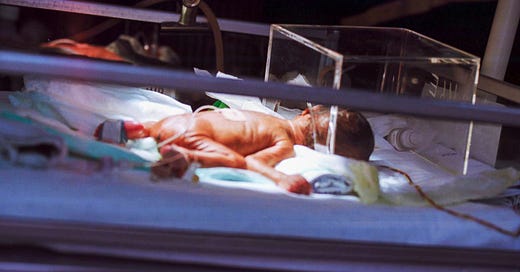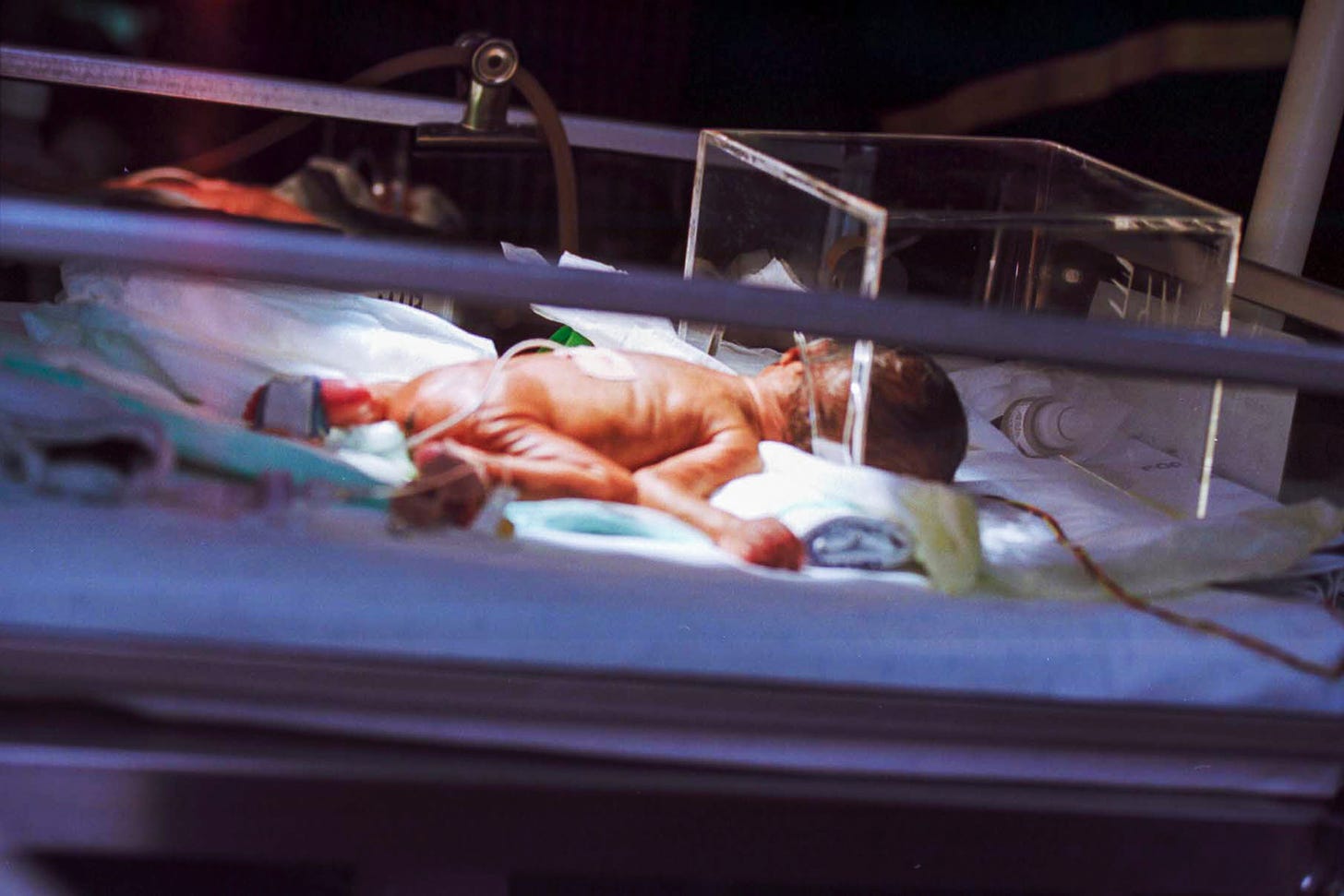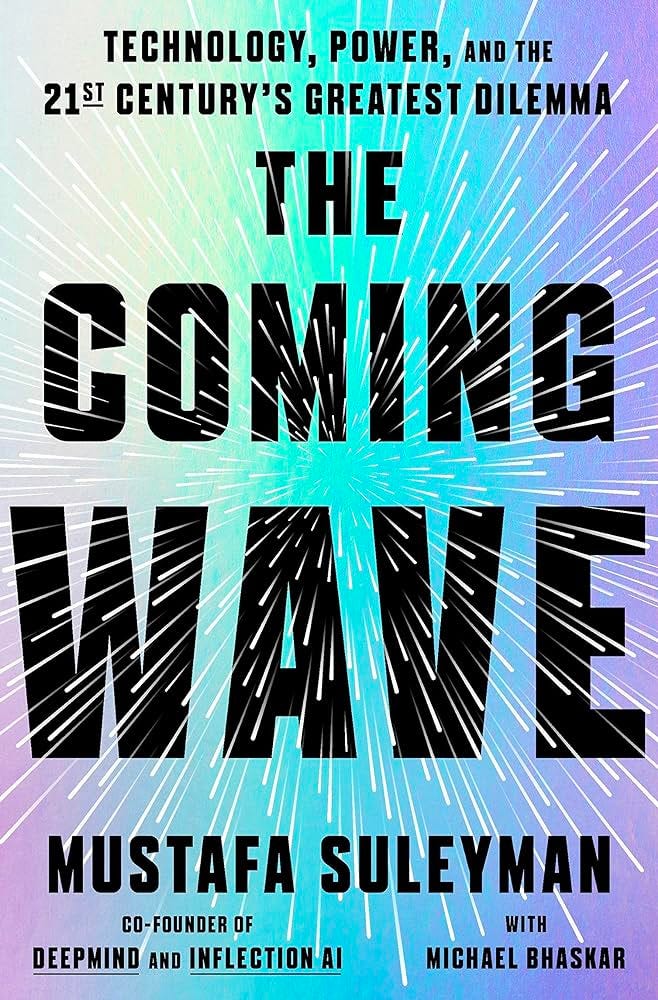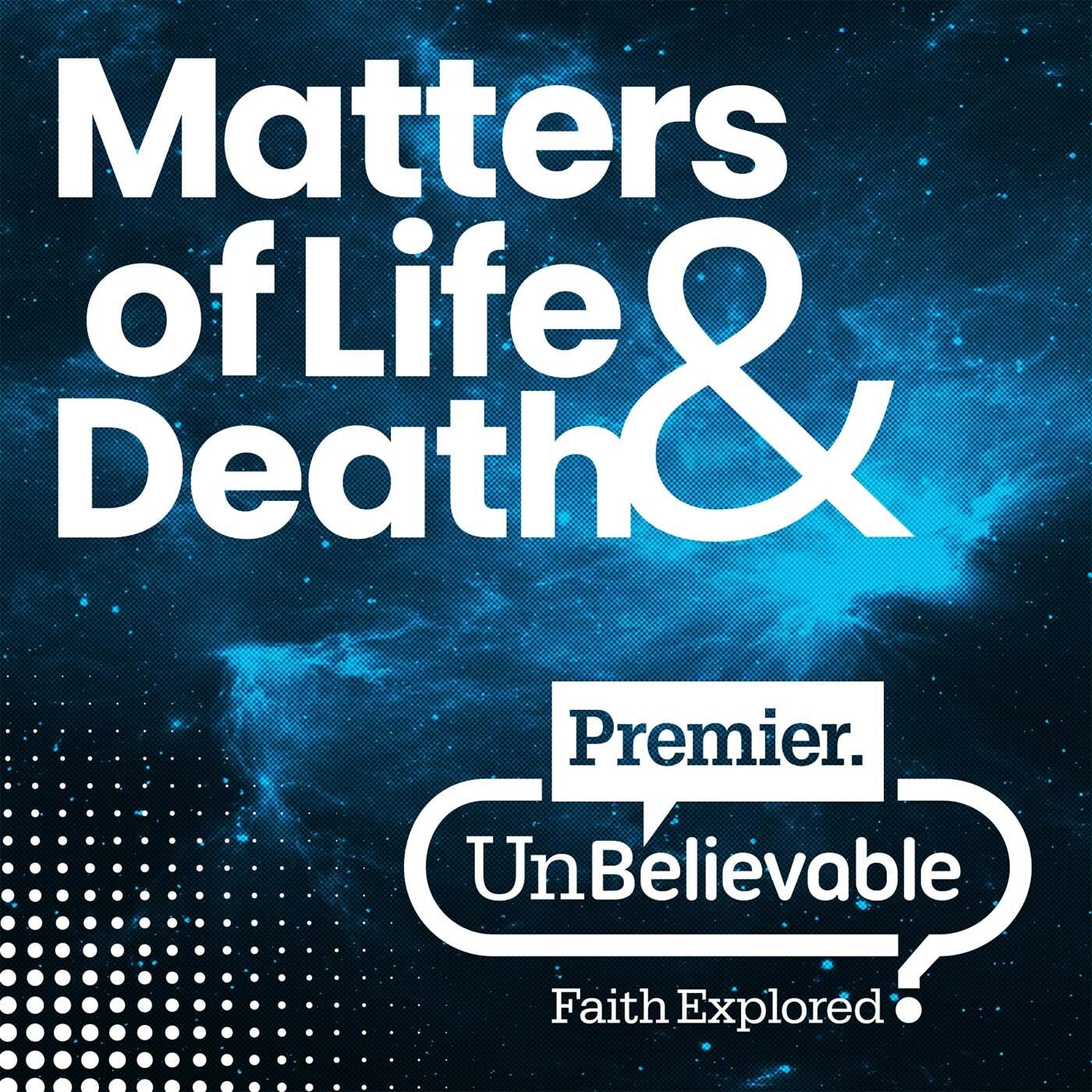Tinsel on the incubator
Reflecting on Christmas as a neonatologist, plus my latest book is out - tackling how to build healthy and safe intergenerational friendships which can transform
Dear friends,
The tinsel and tree are up, Michael Buble is crooning on every radio station, mince pies are everywhere - Christmas is almost upon us. In this edition of the newsletter I’ve written something thinking back to my very different experiences of this season years ago, when I was working as a consultant neonatologist in an intensive care unit at a busy central London hospital. I’ve also shared some of what I’ve been reading at the moment, including exciting news about my latest book just published (and how you can get 25% off the price if you move fast!), as well as my most recent podcast episodes and much more. I hope and pray each of you have a good Christmas and look forward to connecting with you all in 2024.
A neonatologist’s Christmas
There is a special poignancy about a neonatal intensive care unit on Christmas Day. Whilst billions around the world are celebrating the birth of one special baby, we are struggling to care for 20 or more desperately ill and fragile newborns, tiny human beings who cling to life with the help of advanced medical technology.
And technology and Christmas celebrations can intersect in surprising ways. In the baby unit in central London where I spent most of my professional career, every Christmas the senior nurse, decorated the unit with tinsel and cards. Every baby had their own tiny stocking filled with miniature presents, hanging from the incubator door on Christmas morning. The staff would enter into the spirit, putting on Christmas decorations, toys and even tiny flashing lights on name badges and uniforms. Parents, grandparents and siblings visited the neonatal unit to share the special day.
Occasionally an older child or adolescent who had been an inpatient on the unit years previously, would arrive with their family. I remember meeting an 18 year old with a punk hairstyle and nose stud. When she told me her name, the scene came back with a rush. I had just started working as a junior registrar on the neonatal unit and was called urgently to a premature delivery at 24 weeks. The baby weighed 540g, just over one pound, and she was the tiniest baby I had ever seen. I was terrified and out of my depth. Somehow with the help of an experienced neonatal nurse I managed to resuscitate her and place a tiny tube into the trachea to inflate the lungs. I remember rushing down the stairs one floor from the delivery suite to the neonatal unit literally cradling her in my cupped hands. We hooked her up to the life support machinery. She was on the neonatal unit for more than 10 weeks but against all the odds she did well and went home close to the date when she was due to be born, weighing a whopping 2kg. Could that tiny squirming baby in my cupped hands really be the same person as this striking and trendy young lady?
Yet so often it seemed that Christmas day on the intensive care unit was also the setting for personal tragedy. One Christmas I was called in as the consultant on call to see a desperately ill premature baby who was close to death. Whilst festivities were taking place at one end of the unit, I was having a painful and emotionally charged conversation with parents. The ultrasound brain scan showed massive bleeding in both cerebral hemispheres. Despite everything we could do to support the heart there was a progressive deterioration in the baby’s circulation. I tried to explain the situation to the parents as gently as possible. “I’m so sorry to have to give you this news. We’ve done everything we can but I am afraid your precious baby is dying.” The parents are shocked, distraught and barely comprehending. “How can this be happening”.
“We are giving powerful pain killers to make sure that your baby doesn’t suffer. We believe that the right thing to do now is to take away all the tubes and the breathing machine and allow your baby to pass away in peace. Can you agree to this?”
In the midst of the tragedy further words seem trite and unnecessary. We sit together in silence. I remind myself of words that I have often used in teaching others about the care of the dying baby: “Suffering is not a question that demands an answer, it’s a mystery that demands a presence”.
After some time the parents give their agreement and together we gently remove the machinery, the drips and the tubes that are keeping the baby alive. The tiny body is lifted up, wrapped and tenderly placed in the parents’ arms. It’s the first time since birth that they have been able to cuddle their baby without interference from all the apparatus of intensive care technology. We sit in a weepy silence.
I have often reflected on the expression on a parent’s face as they cuddle the tiny body of their dying baby. A strange combination of inexpressible grief, love and wonder. There is something of the preciousness and poignancy of a fragile new life which the deepest love, the desperate love of a parent, cannot protect from death.
Over 30 years working as a neonatologist, caring for the tiniest and most vulnerable of human beings, my sense of both the wonder and the fragility of newborn life has grown. And the familiar Christmas story takes on a new resonance.
Through medical eyes the account in Luke’s gospel of the birth of Jesus is strange, and frankly shocking. Luke is claiming that the ultimate God of supreme power, intelligence and glory, has chosen to become, to turn himself into, a pathetic, fragile, vulnerable baby. Not some kind of Christmas card fantasy cherub with rosy cheeks, beaming smile and halo, but a real baby who cries, and sucks on a human breast. A baby who needs to have his bottom wiped, who needs to be carefully wrapped up and swaddled to prevent hypothermia. A baby who pukes and squits down his mother’s front.
I’m reminded of the flippant medical definition – “a baby can be regarded as a gastrointestinal tract with no sense of responsibility at either end…”
Is that the kind of being that any self – respecting divinity would choose as a means of self-revelation? In the culture of the time babies were often despised and neglected. Infanticide was common, even routine, in the Roman world, approved by many philosophers and statesmen. Both Plato and Aristotle supported infanticide of abnormal or weakly infants. At almost exactly the same time as the birth of Jesus, a Roman physician is writing a textbook for midwives. It includes a chapter called “How to choose the newborn that is worth rearing”. The author recommended a detailed clinical examination immediately after birth in order to detect any abnormalities or signs of illness. In fact the recommended methods were very similar to the way I was taught to examine newborn babies 2000 years later. In Roman times it was standard clinical practice for babies who were too small or weak or malformed to be worth rearing to be exposed, strangled or drowned at birth. In the culture of the time it was the so-called masculine virtues which were universally respected – strength, athleticism, military prowess, courage – of what possible significance was a puking, wailing baby?
The suggestion that the God of the universe might become a baby like that was ludicrous, crude, offensive. To the orthodox Jew, God’s glory was eternally hidden from human eyes in deepest darkness, worshipped by seraphim and cherubim. To the Platonic philosophers of the time God was mystical and immaterial – the eternal Form of The Good – far from the sordid realities of a stable.
And Luke revels in the paradoxes. The angels with their astonishing message unaccountably bypass the religious elite in Jerusalem and proclaim good tidings to a collection of humble herdsmen on the hills. The infant King is worshipped not by seraphim and cherubim but by a bunch of shepherds. And if the tradition is right that Jesus was born in a stable – then I have to say it is an incredibly dodgy and dangerous place for a newborn baby. If I had been asked to give a bit of neonatal advice to the Almighty I would have advised against it. Filled with animal droppings, anaerobic bacteria, and tetanus spores – a stable was the last place to choose to give birth.
Most strangely God reveals himself in weakness, fragility, dependence. The God in that manger can do absolutely nothing for himself – he is totally dependent on human hands to feed him, to clean him, to protect him. And yet the historic Christian faith claims bizarrely that his divine power and status is not in any way demeaned by vulnerability and dependence.
Two thousand years later fierce ethical debates about the value of a newborn baby’s life continue, as I know only too well. Is it really worth investing serious NHS resources to give a premature baby born at the limits of viability a chance of survival? At current NHS prices it costs on average somewhere between £50,000 and £100,000 for every surviving extremely premature baby. Is that really a price that the country can afford? Or should we focus on the bigger babies who have the best chance of healthy survival. Should we like the ancient Romans be concentrating on identifying the newborn that is worth rearing?
And can a newborn baby be regarded as a person with full human rights or as merely some kind of potential being whose value depends on social approval and acceptance. A vocal minority of philosophers, such as Peter Singer from Princeton University, have argued that a newborn baby cannot be regarded as a person. After all, Singer argues, to be a person is to be aware of your own existence as a continuing self, capable of exercising choice and autonomy. A baby is a human being but a non-person, – it is only later on in childhood that self-awareness and autonomy dawn, and personhood with all its rights and legal protections is achieved. So, it is argued by Singer and many others, a newborn baby should be regarded as a being with the potential to become a full person in the future, but it’s life can be terminated now if for whatever reason the value of that life is reduced.
But it seems to me that the story of Christmas points in exactly the opposite direction, to the intrinsic and irreplaceable value of a baby’s existence – to the unique significance, wonder and mystery of each precious and vulnerable life. The Christmas story connects in a strange way with that scene in the neonatal unit, a tiny dying baby cradled in the arms of loving, grieving parents.
In our modern secularised age which often seems to prize the masculine virtues, where autonomy, control, self-determination, are frequently lauded as the greatest goods of life, and where dependence on others is all too often demeaning and dehumanising – it seems to me that the story of Christmas has special resonance – dependence and fragility do not diminish our unique status and human value.
And whatever happened to Luke’s strange narrative. Surely that crude and offensive story of a pathetic, fragile God squirming in a borrowed animal’s manger was doomed to oblivion compared with the eternal and beautiful truths of orthodox Judaism, ancient noble religions and Platonic mysticism.
And yet here we are 2000 years later. Great convulsions have taken place in world history and thinking. The Roman Empire disintegrated. Islam rose and flowered. In the history of thought we have had the Renaissance, The Reformation, The Enlightenment, the 20th century – they have all come and gone. Science and technology have transformed our world and our understanding. The acids of secularism have destroyed comfortable religious dogmas.
And here we are in December 2023. Platonic mysticism doesn’t seem to have too many followers and most of the ancient noble religions have been banished to the dustbin of history. And this month two billion of the planet’s inhabitants will be celebrating the birth of a pathetic fragile baby in a stable.
The Christian faith claims that God has become one of us. God is found in human flesh, in the fragile, vulnerable and wonderful forms which we care for in our neonatal units.
Because God became a baby, all babies are special.
What I’ve been reading
The Coming Wave, AI Power and the 21st Century’s Greatest Dilemma, Mustafa Suleyman. This is a well-written and accessible overview of the problems of AI regulation and control, and the risk of future catastrophe, written by a highly influential AI leader. Suleyman was co-founder of Deep Mind, and has had an insider’s perspective on the spectacular developments in AI over the last decades. He writes very honestly about inside discussions about ethics with industry leaders in Google, Microsoft and other companies. He comes up with 10 practical steps for AI containment. If you are going to read one secular book about current AI developments and risks, I recommend this one.
Powerful Leaders? When church leadership goes wrong and how to prevent it, Marcus Honeysett. An insightful and practical examination of the subtle mechanisms and processes by which well-meaning Christian leaders can become increasingly coercive and abusive. Instead of presenting a simple binary between good and bad leadership, Honeysett provides a very helpful analysis involving 5 downward stages in the use and misuse of power, ranging from the legitimate and godly use of power, through to the most serious and damaging abuses. A valuable framework for assessing any local church community.
Finally my own book Transforming Friendship, investing in the next generation has been published by IVP. It is available from the Eden website with a 25% discount using the code JOHNWYATT25 until the end of December 2023. The code can be applied at the online checkout.
John Stott would never have called it ‘mentoring’, but, throughout his life, he instinctively drew alongside younger men and women from across the world, gently pastoring them within the context of a warm, genuine and healthy “Paul-Timothy” friendship. Why aren’t these intergenerational friendships more common in the church today?
In Transforming Friendship, I acknowledge that recent serious scandals and suspicion prevalent in our culture have made people more cautious about these kinds of relationships. The church, therefore, needs to lead the way in seeing friendship transformed into something safe, life-giving and Christlike.
In the book I try to share the transformative experience of being Stott’s close friend. Using examples from the Bible, Christian history and the church today, it makes the case for a model of “Gospel-crafted” friendship, with a particular emphasis on the need for more Paul-Timothy type relationships like the one I enjoyed with Stott.
My latest podcast
Redemption: Always Plan A, sharing in Christ’s sufferings, a Disney fairy story, and the offensive incarnation
Creation. Fall. Redemption. New Creation. Our series on the theological foundations of Christian ethics and the grand narrative of the Bible has reached the third chapter – redemption. How is the story of what Christ accomplished on the cross a uniquely Christian approach to the problem of evil, and what light does it shed on our approach to everything from artificial intelligence to reproductive medicine? In this episode we discuss the mysteries of the cosmic universal story of redemption – with a lamb slain from the foundation of the world alongside a real historical man dying in a real place and time once and for all. And we try to think through why this redemption story seems to be retold time and time again across our secular culture, from Marvel superhero films to Harry Potter, and why it remains so compelling and yet also strangely impossibly optimistic.
You might also enjoy some other recent episodes:
Science and religion 1: The myth of conflict, Charles Darwin’s beetle research, epistemic humility, and English country churchyard or Californian fridge?
Women and Christianity: Purity culture, beyond complementarianism, baggy t-shirts over swimming costumes, and recovering Tamar’s voice
Origins of covid: Gain of function research, zoonosis, the Wuhan Institute of Virology, and truth over tribe
Baby loss 2: Rising abortion numbers, pills by post, ‘the pregnancy remains’, and Schrodinger’s fetus
The latest resources on my website
Podcast: Thank God It’s Monday
How can Christians working in healthcare sustain and grow faith, while also seeing God at work in their hospitals and clinics?
Podcast: Ministry in the age of AI
Where are the theologians, writers and thinkers who are going to help the church navigate our new artificially intelligent world?
Find many more articles, videos, talks and books to stimulate your own thinking at:







